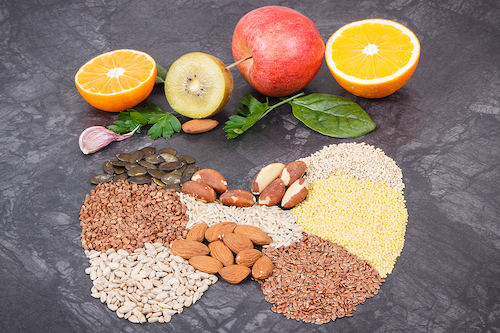Thyroid disease affects one in five women and one in ten men, yet 50% of people with thyroid disease go undiagnosed. This can lead to weight gain, hair loss, trouble sleeping hormone imbalance, and more. The tiny thyroid gland regulates many body processes, so learning how to provide essential key nutrients for the thyroid can help keep it in tip-top shape.
Functions of the Thyroid Gland
Hormone Production
The thyroid gland is a small, butterfly-shaped gland in your neck. It produces two major thyroid hormones:
Triiodothyronine (T3)
T3 is the active thyroid hormone. It is critical to ensure every system in your body works at the right speed. Moreover, it plays a role several major processes, including regulation of cholesterol, memory, metabolism, hair growth, fertility, as well as the maintenance of heart rate, respiration, and body temperature.
Thyroxine (T4)
T4 is the inactive form of thyroid hormone that your body converts into useable T3.
How it Works
The hypothalamus and pituitary glands regulate the production and secretion of T3 and T4 via thyroid-releasing hormone (TRH) and thyroid-stimulating hormone (TSH), respectively. Thyroid hormones participate in a feedback system in your brain that also regulates many other hormones. Thus, the thyroid plays a part in regulating insulin, cortisol, and sex hormones.
When you don’t produce enough T3, or if your body lacks the nutrients to convert T4 into this active thyroid hormone, this is when problems arise. Thyroid dysfunction can affect metabolism, cellular development, and weight management, as well as cause other miserable symptoms.
Hypothyroidism
Hypothyroidism is the term for an under-active thyroid gland. Common symptoms of hypothyroidism include:

- Trouble sleeping
- Tiredness and fatigue
- Difficulty concentrating
- Dry skin and hair
- Hair loss
- Depression
- Sensitivity to cold temperature
- Frequent, heavy periods
- Constipation
- Joint and muscle pain
Hyperthyroidism
Hyperthyroidism, also called overactive thyroid, is when the thyroid gland produces more thyroid hormones than your body needs. While not as common as hypothyroidism, it can lead to other serious health concerns as well. Indicators of an over-active thyroid gland include:

- Anxiety
- Irritability or moodiness
- Nervousness and hyperactivity
- Sweating or sensitivity to high temperatures
- Hand trembling
- Hair loss
- Missed or light menstrual periods
Causes of Thyroid Dysfunction
Numerous culprits—from genetics to lifestyle choices—can affect thyroid function. Perhaps the most prevalent contributors to thyroid dysfunction include:
Inflammation
Inflammation in the body disrupts the endocrine system and causes immune system overdrive. This can adversely affect the thyroid gland. Poor diet is one of the biggest causes of bodily inflammation. Gluten, processed foods, food dyes, and other additives cause inflammation. An excess of meats, dairy products, and alcohol can also negatively impact the body.
Nutritional Deficiencies
Avoiding the wrong foods may not be enough. It’s important to make sure you consume foods that contain essential vitamins and minerals for your thyroid. We’ll discuss some of the specific nutrients your thyroid needs later in this post.
Exposure to Endocrine Disruptors
We encounter numerous toxins throughout the day. Many of these toxins can disrupt the function of the thyroid gland, as well as many other endocrine organs. These toxins may be in the form of pesticides in our food and water, heavy metals, chemicals in personal care products, and more.
Stress
There is an intimate interaction between stress hormones and thyroid function. For this reason, addressing your stress levels is vital to correcting poor thyroid function.
3 Essential Nutrients for the Thyroid Gland
Several nutrients are necessary for the production of thyroid hormones as well as the conversion of T4 to T3.
Iodine
Approximately 90 to 95% of all available iodine in the body is located in the thyroid gland, and iodine deficiency is the most common cause of hypothyroidism worldwide. Iodine is a necessary component of T3 and T4. Because our bodies do not synthesize it, it’s important to make sure to get it through diet. The widespread iron deficiency is the reason for iodized salt. However, you can select healthier options to increase iodine intake. Consider eating foods such as fish, seaweed, navy beans, potatoes, parsley, and dairy products, or adding an iodine supplement to your routine.

Selenium
The proper balance of thyroid hormones also depends on adequate selenium, which is involved in the process of converting T4 to T3. Selenium also plays a role in protecting the thyroid gland from toxins. Selenium deficiency can degrade cellular thyroid activity, even when hormone levels are normal. Brazil nuts, yellowfin tuna, halibut, spinach, and eggs, contain selenium, or you can take it in a supplement.
Zinc
Zinc is also essential for the conversion of thyroid hormones and helps maintain a healthy metabolism. The following foods provide zinc: pumpkin seeds, shellfish, legumes, eggs, whole grains, dark chocolate. Or you can also take a zinc supplement.
Essential Oils for the Thyroid Gland
Essential oils may help calm anxiety and sleeplessness associated with thyroid imbalance. They can also help combat inflammation and offer protection to the entire endocrine system.
Essential oils to reduce inflammation
- Lemongrass
- Copaiba
- Basil
Essential oils to reduce stress
- Lavender
- Sandalwood
- Frankincense
Essential oils that support thyroid function
- EndoFlex Blend – a blend of spearmint, German chamomile, sage, sesame seed oil, myrtle and geranium essential oils. This blend may help support the overall function of the thyroid gland.
- Rosemary – may help reduce hair loss associated with thyroid dysfunction
- Myrtle – an adaptogen that may help regulate the function of an over- or under-active thyroid.
Want to dig deeper into understanding your thyroid health? Come download this free booklet!



